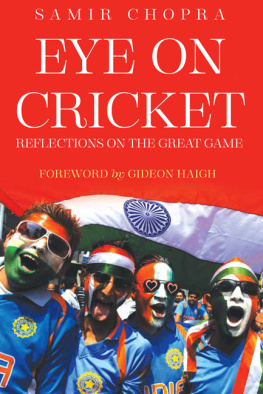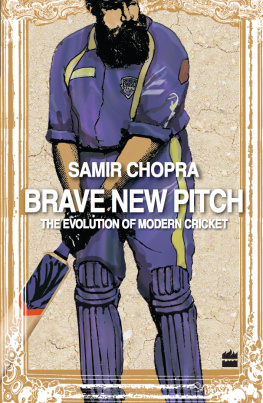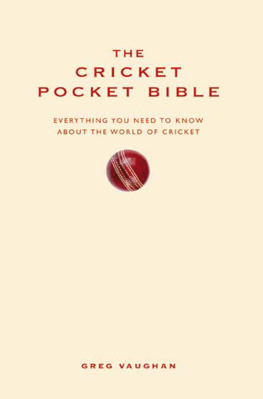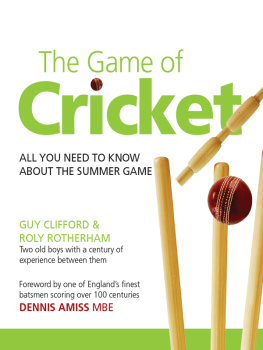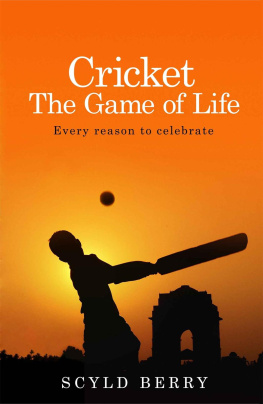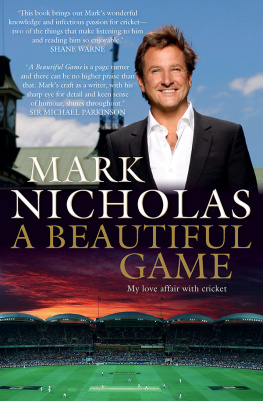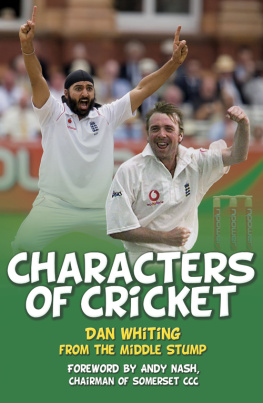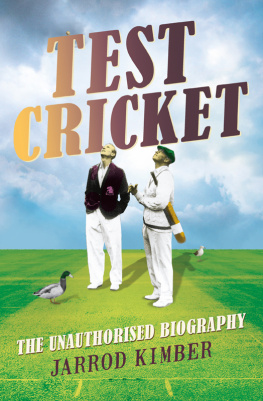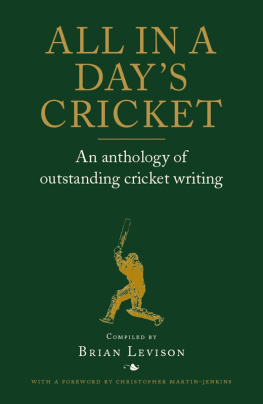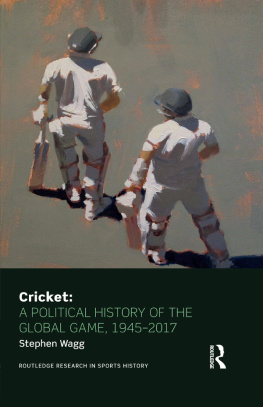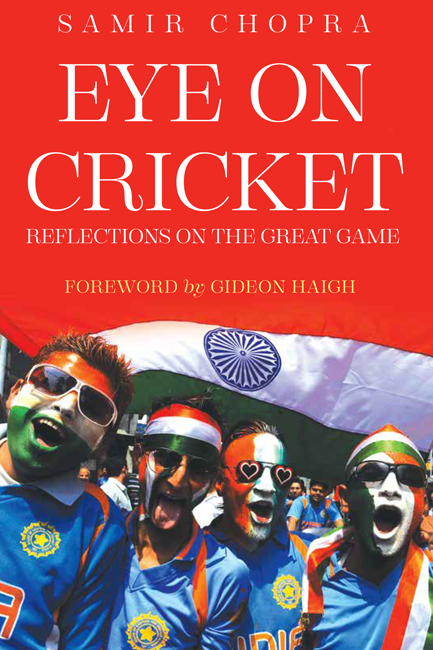
To Noor and Ayana, for making a home with me.
CONTENTS
I suspect that Samir Chopra and I were born to at least correspond. His blog profile lists as his interests cricket, free software, military history, military aviation, hiking, tattoos, industrial music, travelling. I dont necessarily share those interestsalthough the military and musical tastes overlapbut they are interesting, and he brings to his cricket writing the sort of well-stocked and free-ranging mind ever in short supply.
Cricket bloggers have a tendency to come and go, say what they have to say, and move on. Samir, I think, gets better and better. I enjoy his style of taking a stray or miscellaneous pense, then comparing and contrasting, unpicking and elaborating, until a surprisingly rigorous argument has been constructed and a provocative conclusion reached, whether its that Andy Flower had a nerve asking India to withdraw its run-out appeal for Ian Bell at Trent Bridge in 2011, or that Fire in Babylon was frankly overpraisedviews I happen to share, although that is less the point that Samir makes such trenchant yet civil cases. They are like watching cricket with a thoughtful and challenging companion. Perhaps these are the conversations Samir would like to have had with someone at a Test match, but, alas, has had to conduct with himself in his self-imposed east-coast American exile. If so, were fortunate that hes condemned to partake of his cricket by the interwebs in splendid isolation, as he describes in another lovely cameo here.
There was a lot that set me nodding in Eye on Cricket, in recognition and assent. Yes, sport is grossly overstuffed with martial imagery; yes, I also tend to appraise every library by what is on the shelves at 796.358. Being one himself, Samir understands the playing fan and the vernacular cricketer with great acuity. No game, no physical or cultural endeavour, can survive or be sustainable if held aloft only by the efforts of those most proficient at it, should hang in a gilded frame in the office of every cricket administrator. I revelled in cricket-nerdish references to a light appeal by Sew Shivnarine, and to Kirti Azads Finest Hour too. Id read many of these pieces previously, yet was struck by how well they cohered in this collectionit was almost as though Samir had been unconsciously working towards this totality all along. I am surprised only that he has never written anything about Jade Dernbach. After all, it would bring together two of his interests. Over to you, Samir.
Gideon Haigh
POSTCARDS TO MY CRICKET HOMELAND
As I take guard to introduce this collection of essays, it is perhaps appropriate for me to reflect why I write on cricket. I do waffle on quite a bit: I have blogged on cricket for over seven yearsfirst, at my personal blog, Eye on Cricket ; then, thanks to the good folks at ESPNcricinfo, on more prominent platforms and soapboxesI have also written two books on cricket. Thats hundreds of thousands of printed words. Before that, from 1990 to 1997, I wrote on rec.sport.cricket, the Usenet cricket newsgroup (it now exists as a Google group), chatted with cricket fans on the Internet Relay Channel, and wrote many cricket-centric emails to friends. Why write so much on and about a mere game? Can twenty-two men or women in white, knocking around with bat and balla reductive description whose absurdity often strikes me in unguarded, perspective-shifting momentsreally be that productive and stimulative of intelligent rumination, analysis, and commentary?
In my attempted answer, I want to focus on my particular and peculiar station as a writer who grew up in a cricketing country but now lives abroad inwith all due respect to American cricketers and fansa cricketing wasteland. I have often worried I was peddling too much nostalgia in my blogging at ESPNcricinfo, that I was subjecting my readers to a gushing sentimentalism. It was not that all my posts were thus; indeed, I am often pleasantly surprised by the diversity of subjects I have written on. But there is little doubt that nostalgia continues to make an appearance in my writings. Much of what you read in the following pages will not be nostalgic, but the animating force, the primeval motivation that makes me sit down and write about cricket is ultimately, I think, nostalgic. This should be unsurprising, for I am an immigrant; nostalgia and homesickness are my supposedly perennial states of being.
Nostalgia is a term coined by a Swiss doctor, Johannes Hofer, in a dissertation submitted to Basel University in 1688; it was used to describe a depressed mood caused by an intense longing to return home. The disease had been noticed among Swiss mercenary soldiers yearning to return from their excursions in the flatlands of Europe to their Alpine mountainous perches. I was introduced to this etymologyand its history of diagnosis among American Civil War soldiersby my friend and fellow cricket fan, David Coady, professor of philosophy at the University of Tasmania. On hearing it, I realized I should have guessed from the -algia suffix and my own personal experiences that the term denoted a painful medical condition.
There are two kinds of nostalgia: restorative , which concerns itself with returning to the lost home, and reflective , which concerns itself with longing and the sense of loss. It is reflective nostalgia that sustains and animates the restorative variety; it infects and colours many dimly perceived and understood instinctive reactions of minelike a sudden lump in my throat or a moistening of the eyes when viewing a cricket documentary or listening to a musical fragment like Booker T and the MGs Soul Limbo , the soundtrack for the BBCs Test match highlights reel. My writing about cricket is a form of reflective nostalgia. It displaces me profoundly; when I write on cricket I am no longer in the US. I have written this book at home in Brooklyn, in a library in midtown Manhattan, at my in-laws home in Cincinnati. At each locale, while in America, I have moved away from it by writing about cricket.
For the first few years of my life in the US, I lost track of the cricketing world and entered a strange purgatory where cricket news felt like missives from a distant planet. Now, even though I can watch all the cricket I want, Im still infected by an incurable homesickness that I cannot stop hoping will be palliated and perhaps even cured by conversationwhether electronic or verbalwith others who love and obsess over cricket like I do. The homesickness, the homeward-bound gaze of the immigrant is a well-worn and perhaps excessively theorized clich now, but its emotional impact remains the same as it ever was. Like many others like me, I miss the light of the north Indian winters, the brilliant sunshine that warmed my non-centrally heated body as I emerged from a cold Delhi interior, the colour and pomp and circumstance of the yearly festivals, the distinctive aromas of marketplaces. I also miss the sounds and sights of cricket: crackling radio commentary and street games and men and boys in white on green and brown cricket fields. Twenty-seven years of self-imposed absence have attenuated this feeling, as has the non-stop saturation by international cricket and its constant on-call presence in video-streaming websites and satellite television; but the desire to talk about cricket has not gone away.
I still feel words spring to my lips as I watch a game; I still find myself possessed by an incurable itch when I witness cricketing folly or excellence, one only assuaged by writing. It does not matter whether someone reads my writings. When I began blogging, my posts disappeared into the ether, falling stillborn from the press, one after another. I wrote because I had to, because it was the only way to address and articulate crickets place in my life.
Next page
